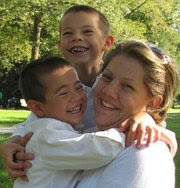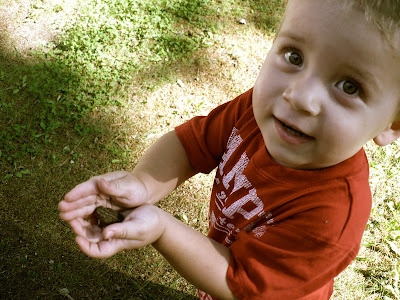As mentioned in my previous post, Home Schooling - is it Legal?, I hope to break down some common questions asked of us about homeschooling to provide a better understanding for those who may be considering homeschooling or those who are simply curious.
Common questions about homeschooling include questions about what is taught, and how we know what to teach. They include questions about who supplies materials, where we get them and how we know what to use.
Before these questions can be answered well, the question
"What is education?"
must first be answered.
"What is education?"
must first be answered.
When we first began to homeschool, our oldest son was an infant. Yes. An infant! As new parents, we learned very quickly that our son was learning new things daily. We were not schooling him, per se, yet we saw that he was learning regardless.
We began to process what education really was, apart from what we'd been taught from the American education system. Was it simply reading, writing and arithmetic, perhaps with a little Bible instruction thrown in on Sundays? We had certainly not taught the 3 R's to our infant, yet we found ourselves marveling at the way he seemed to have an innate desire to learn.
We began to process what education really was, apart from what we'd been taught from the American education system. Was it simply reading, writing and arithmetic, perhaps with a little Bible instruction thrown in on Sundays? We had certainly not taught the 3 R's to our infant, yet we found ourselves marveling at the way he seemed to have an innate desire to learn.
The years passed. Years filled with the atmosphere of home, much training and discipline, and ... life.
The boy was still learning!
In the very early years of parenthood, I researched a great deal. We read and read more about the approach we would take. How would we approach this lifestyle that we felt called to, but was foreign? Many books proved helpful, then I read
For the Children's Sake: Foundations of Education for Home and School by Susan Schaeffer Macaulay.
In this I read,
"Education is an atmosphere, a discipline and a life" - Charlotte MasonThat was it!
That was what we'd already been doing. Without completely realizing it, we had been educating our son just through daily living. He was learning habits of discipline. Moral, mental, physical, spiritual discipline. He was in an atmosphere that fostered and encouraged a quest for information, for development, for growth.
He was learning. Being educated!
He didn't need preschool. He learned his colors just fine. Banana's are yellow, oranges, orange and M & M's come in a rainbow of colors! He learned to throw, catch and hit a ball by playing often in the yard with his Dad. He could ride a two wheeler by age 5. One cookie plus one more cookie makes two cookies! He gardened and bird watched with Grandpa.
We spent hours and hours at the local audubon properties surrounded by nature - exploration led by he and his little brother. Stopping as they wished to lay on their bellies and examine frog eggs with magnifying glasses or to turn over rocks in search of slugs. One day they found two. Each held one and they deemed themselves the "slug brothers". This was when they were 4 and 2.
This proved far more suitable for young minds than four walls. Isaiah learned to read by reading his field guide, wanting to identify all that he saw. He learned very young to love and appreciate creation.
He is not exceptional, except perhaps to me! He is a bright child, but not a genius. In fact, at our recent visit to the Basketball Hall of Fame he remarked at how different basketball must have been when Dan and I played for fun in college, what with playing with a peach basket and all! Does he really think we're that old!?
Most children are born with this desire to learn new things. When given the proper atmosphere and discipline, a life that fosters learning, education, freedom to explore, to play and to create, there will be a spark.
Kindergarten was fast approaching...
Isaiah was nearing his 6th birthday when we began. We had chosen not to start him early, though he showed what many would call signs of readiness. We remain more than pleased with that decision!
Wanting something to guide us in our daily academic pursuits in the coming years, I spent hours prior to the start of Isaiah's kindergarten year pouring over curriculum options online. Narrowing down and narrowing down more, then presenting Dan with the ones I most liked for him to help make a decision. If you have not had this experience it can be overwhelming! There are many many options to choose from!
{To help you with this process, feel free to view and print the free printable "Choosing a Christian Homeschool Curriculum"} found under the homeschool tab above.}
Our prayerful curriculum search led us to My Father's World.
We are in our 4th year already of My Father's World (MFW) and it has been the perfect fit for our family. It is an eclectic combination of the Charlotte Mason, unit study and classical methods of homeschooling with a Biblical worldview. It is easy to use, there is minimal preparation and numerous children of varied ages can easily be taught together. There is an international focus, chronological history, and our favorite feature is that the Bible content is integrated.
We believe that Christ should be central to life, and therefore He should be central to our academic studies as well. What kind of education is it if Christ is absent, or reserved for an hour on Sunday mornings?
I recall always wondering as a kid, how God, Jesus, faith fit into the scope of life. There was no continuity. Subjects don't overlap. English was English, where we read Stephen King and Shakespeare. Science was not connected to history, or english, and the God who created all was very rarely, if ever, mentioned. These subjects, to me, were always like puzzle pieces that never fit together. Faith was something I practiced and sought to learn outside, and struggled to incorporate in class.
Already, in our children's education, we can see that those pieces are less like puzzle pieces and more like building blocks. Each lesson building on another, each lesson intertwined with another, rotating around the central theme and focus, that is Christ.
In summary, the character of our children is of far greater importance to Dan and I than their academic "success". We expect that they work hard and apply themselves, working to please the Lord.
Academics, though important, are secondary to life... but... education is a life.











No comments:
Post a Comment